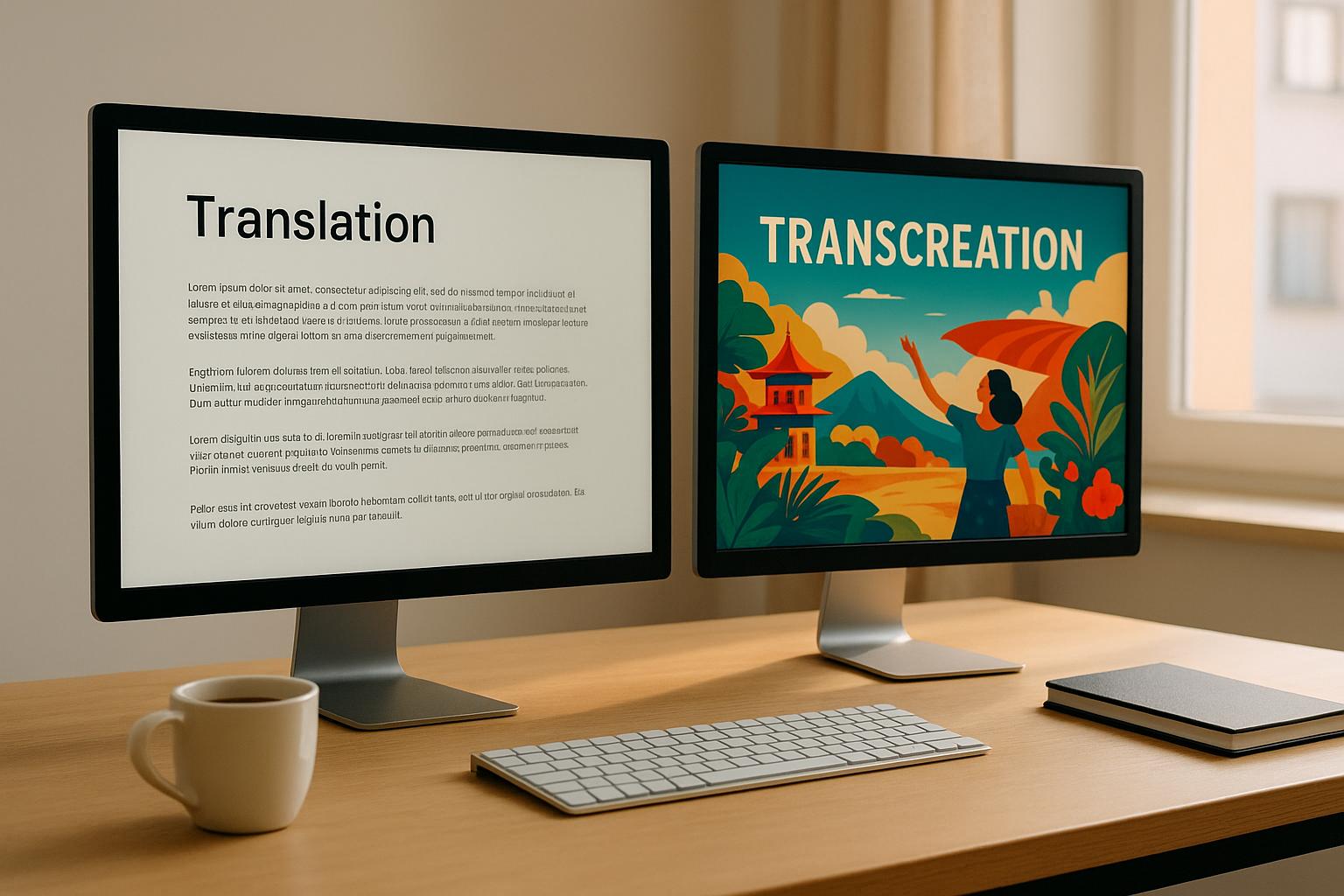AI is transforming how businesses engage customers through personalized marketing funnels. By analyzing customer behavior and automating processes, these tools help companies optimize every stage of the funnel, from awareness to retention. Key benefits include reducing acquisition costs by up to 50%, increasing revenue by 5–15%, and improving ROI by 10–30%. Below are six top AI tools for building effective, personalized marketing funnels:
- 6sense: Predicts high-intent prospects using anonymous web traffic and third-party data.
- Surfer SEO: Optimizes content with real-time keyword and SEO insights.
- Drift: Uses AI chatbots to qualify leads and book sales meetings.
- Unbounce AI: Improves landing page conversions with Smart Traffic and A/B testing.
- Gong.io: Analyzes sales calls to flag risks and provide actionable coaching insights.
- Userpilot: Personalizes user onboarding and predicts churn for SaaS businesses.
These tools integrate with platforms like Salesforce, HubSpot, and Google Analytics, making them accessible for U.S. businesses. Choosing the right solution depends on your specific goals, whether it's lead generation, content optimization, or customer retention.
The Marketing Funnel | Using AI to improve your conversion rate
What to Look for in AI Marketing Funnel Tools
AI marketing tools aren't all cut from the same cloth. With 69.1% of marketers planning to integrate AI in 2024 and 88% already using it daily, the tools that deliver measurable ROI - often boosting sales by 10–20% - stand out. Here's what to focus on when evaluating AI tools for your marketing funnel.
Automation and Predictive Analytics
Automation is a game-changer for eliminating repetitive tasks like data cleaning, audience segmentation, and content optimization. Tools like Marketo Engage and Snowflake Cortex have shown their value by improving lead conversion rates and prioritizing high-value accounts through automated scoring and forecasting.
Predictive analytics takes things further by anticipating customer behavior and market trends before they occur. Businesses tapping into these insights report revenue increases of 10% to 15%. Real-time dashboards make it easy to adjust strategies on the fly, ensuring your campaigns stay on track.
Behavioral Segmentation and Real-Time Personalization
Automation and analytics help predict trends, but understanding customer behavior in real time adds another layer of precision. Behavioral segmentation focuses on actions rather than just demographics, providing a more nuanced view of your audience.
Real-time personalization, on the other hand, adjusts customer experiences instantly based on their current actions. Take Dynamic Yield and Carrefour, for example - Dynamic Yield’s AI and Carrefour’s web push notifications have driven conversion increases of up to 275% and 350%, respectively. Tailored product recommendations also play a big role in boosting revenue and average order value. Adidas offers another compelling case: by segmenting new and returning visitors and offering personalized coupon codes, they achieved a 259% increase in average order value for new users and a 35.5% jump in conversions for returning visitors.
Integration and Scalability
The best AI tools don’t just perform well - they integrate seamlessly with your existing systems and scale as your business grows. Smooth integration with CRM and marketing platforms can improve customer engagement by up to 30% and raise conversion rates by 25%.
Scalability is equally important. Trafilea, for instance, developed AI systems capable of managing over 10,000 ads across 500 campaigns each year, reducing creative production time by 80% and increasing content output tenfold. Notably, 75% of companies report positive ROI from AI and automation investments when they choose scalable solutions. With the global AI marketing market expected to grow from $20.4 billion in 2024 to $82.2 billion by 2030, scalability isn’t just a bonus - it’s a necessity for long-term success.
Whether you need an AI chatbot to improve customer support or predictive analytics to refine your campaigns, the tools you choose should align with your specific goals. The real magic happens when these solutions work together as part of a unified system that delivers tangible results.
Best AI Tools for Personalized Marketing Funnels
Using the right AI tools can make all the difference in tailoring marketing funnels to meet individual prospects' needs. Here are six platforms designed to seamlessly integrate into personalized marketing strategies.
6sense: Predictive Analytics and Account-Based Marketing
6sense uses anonymous web traffic and third-party data to pinpoint high-intent prospects. This helps sales teams focus their efforts on the most promising leads and launch highly targeted campaigns. Its AI-powered email assistant crafts customized messages based on detailed account research and buying signals.
Surfer SEO: Content Optimization
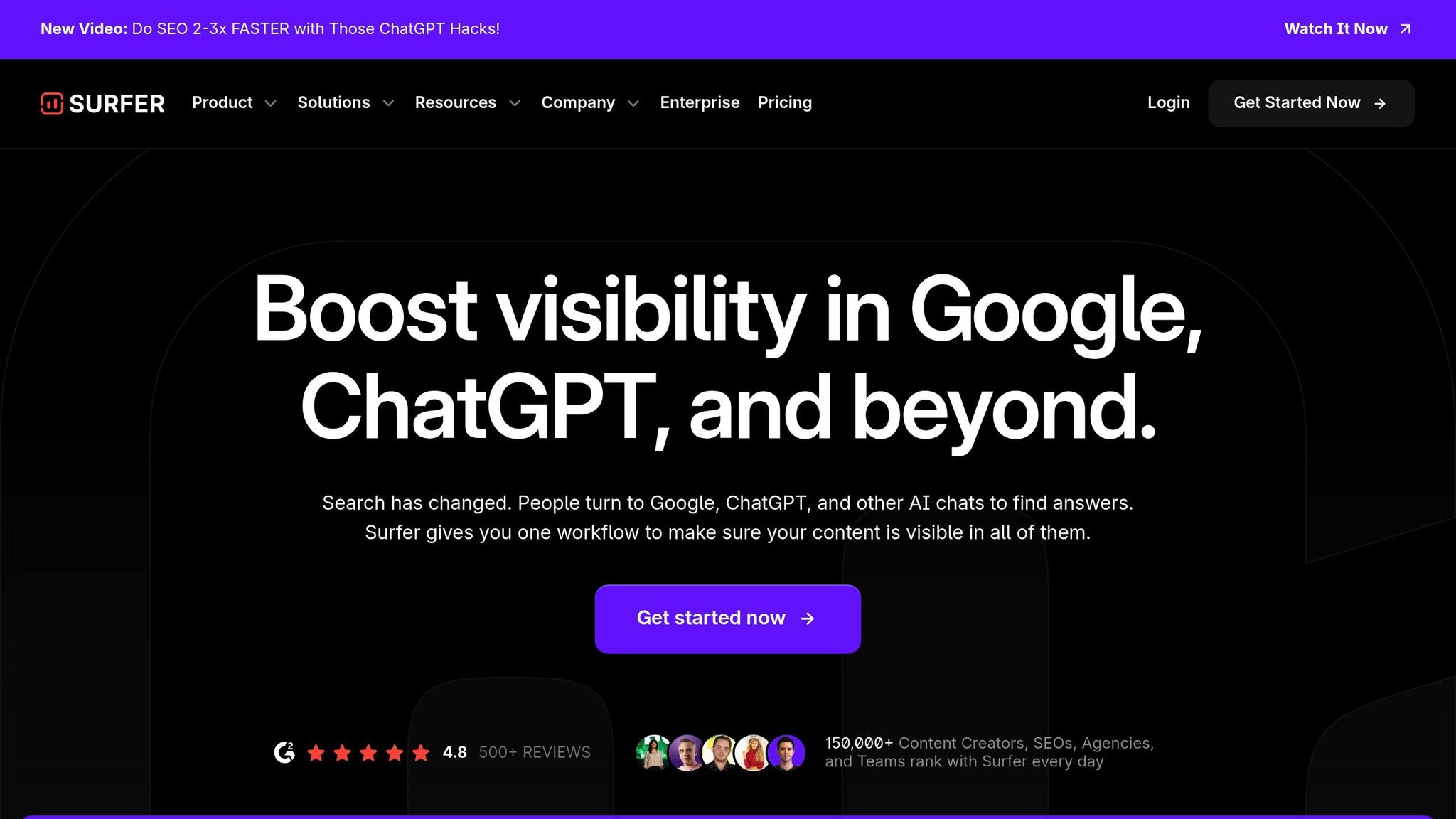
Surfer SEO employs AI to examine top-ranking pages and provides actionable insights on keyword density, content length, and semantic keywords. The platform’s real-time Content Editor ensures blog posts and landing pages align with search engine trends, specifically tailored for U.S.-based audiences.
Drift: AI Chatbots for Lead Qualification
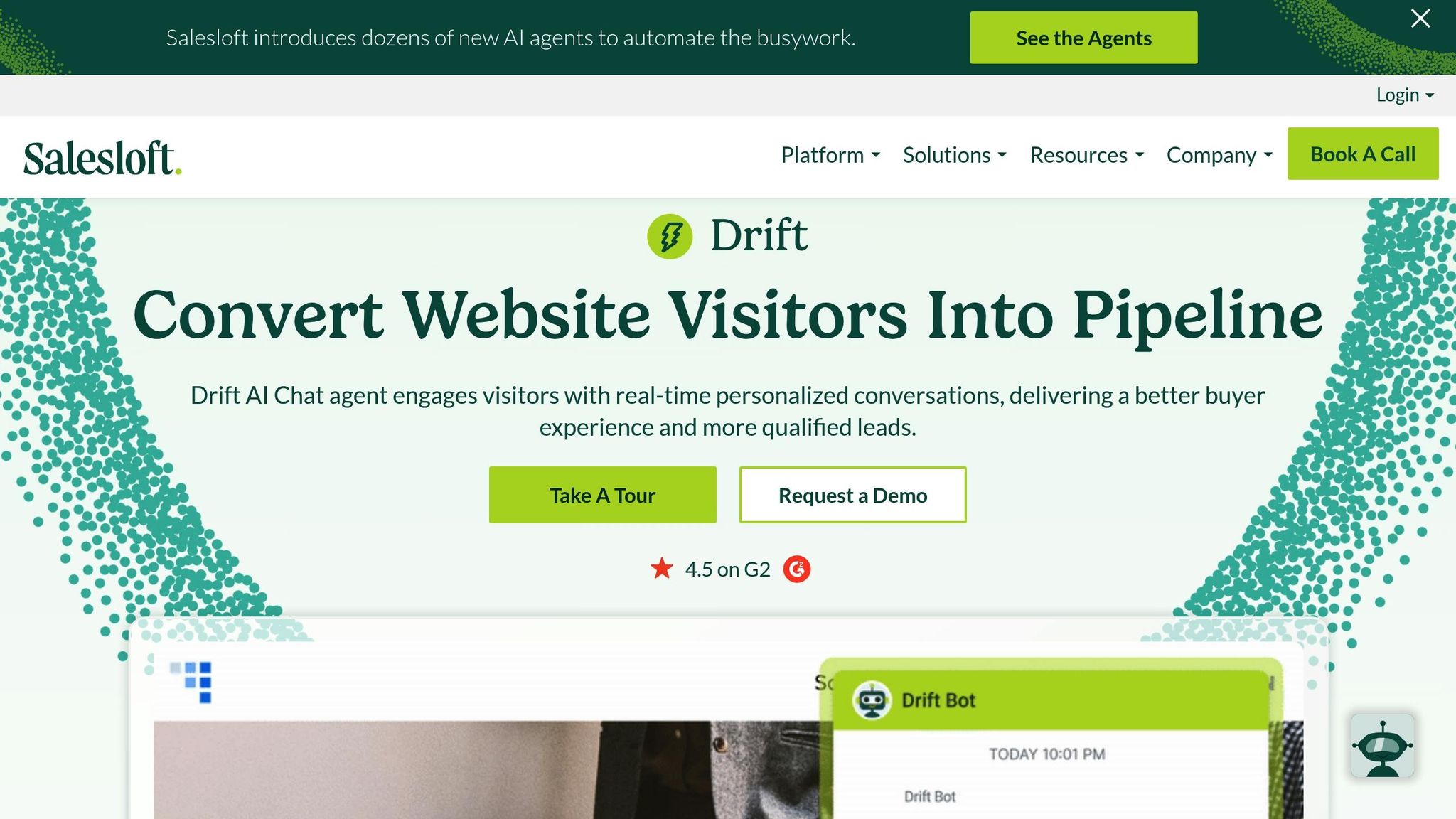
Drift's conversational AI transforms website visitors into qualified leads by engaging them in intelligent, real-time conversations. Its chatbots handle lead qualification, book meetings, and direct prospects to the right sales reps based on factors like company size or industry. Over time, these chatbots improve through continuous learning from past interactions.
Unbounce AI: Landing Page Optimization
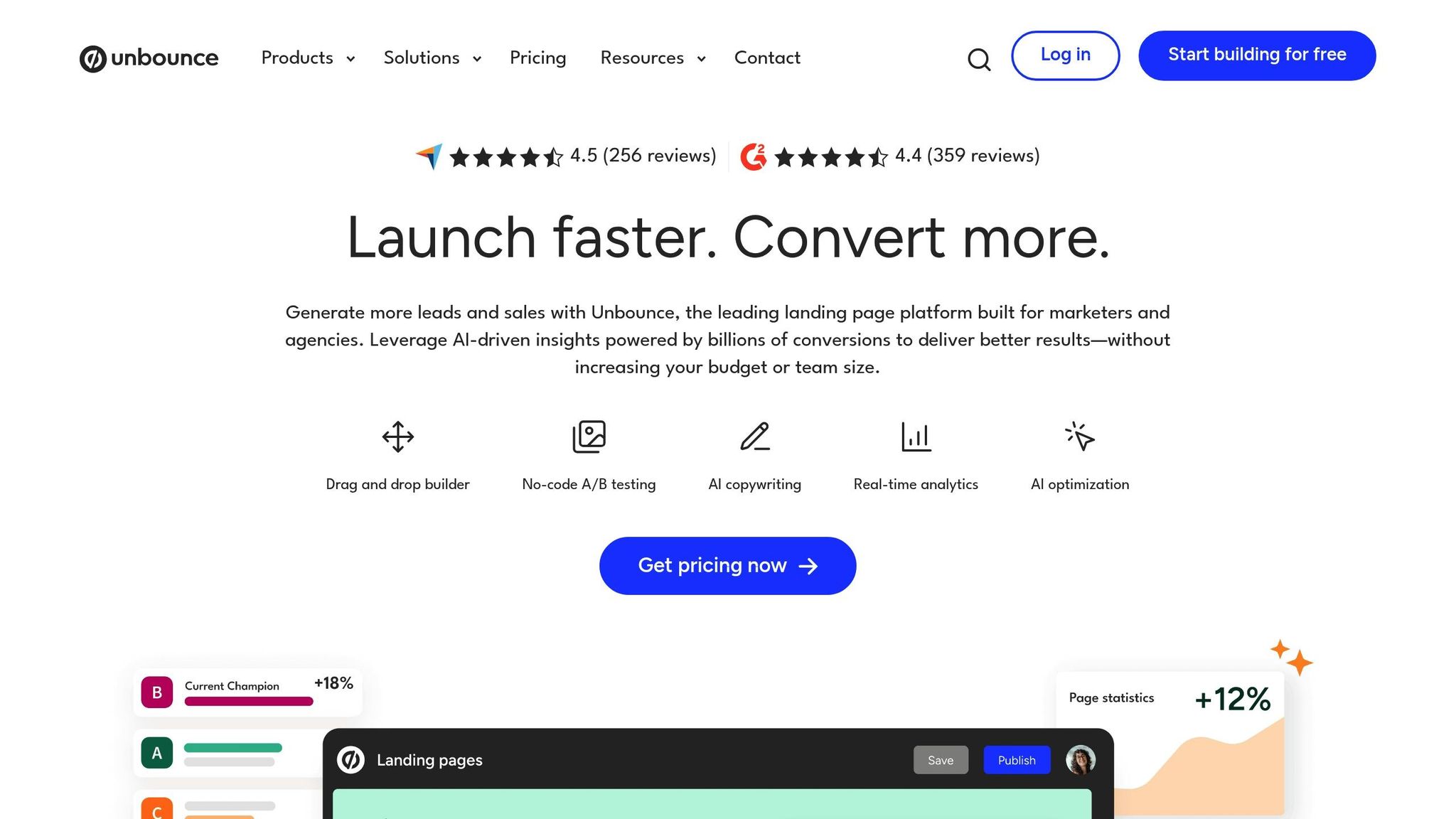
Unbounce AI’s Smart Traffic feature automatically directs visitors to the version of a landing page where they’re most likely to convert. With built-in A/B testing, users can see up to a 25% boost in conversion rates. It also formats key details - like phone numbers and currency - according to U.S. standards. Plans start at $79/month for Essentials, with Enterprise options available at $199/month.
Gong.io: Sales Call Analysis
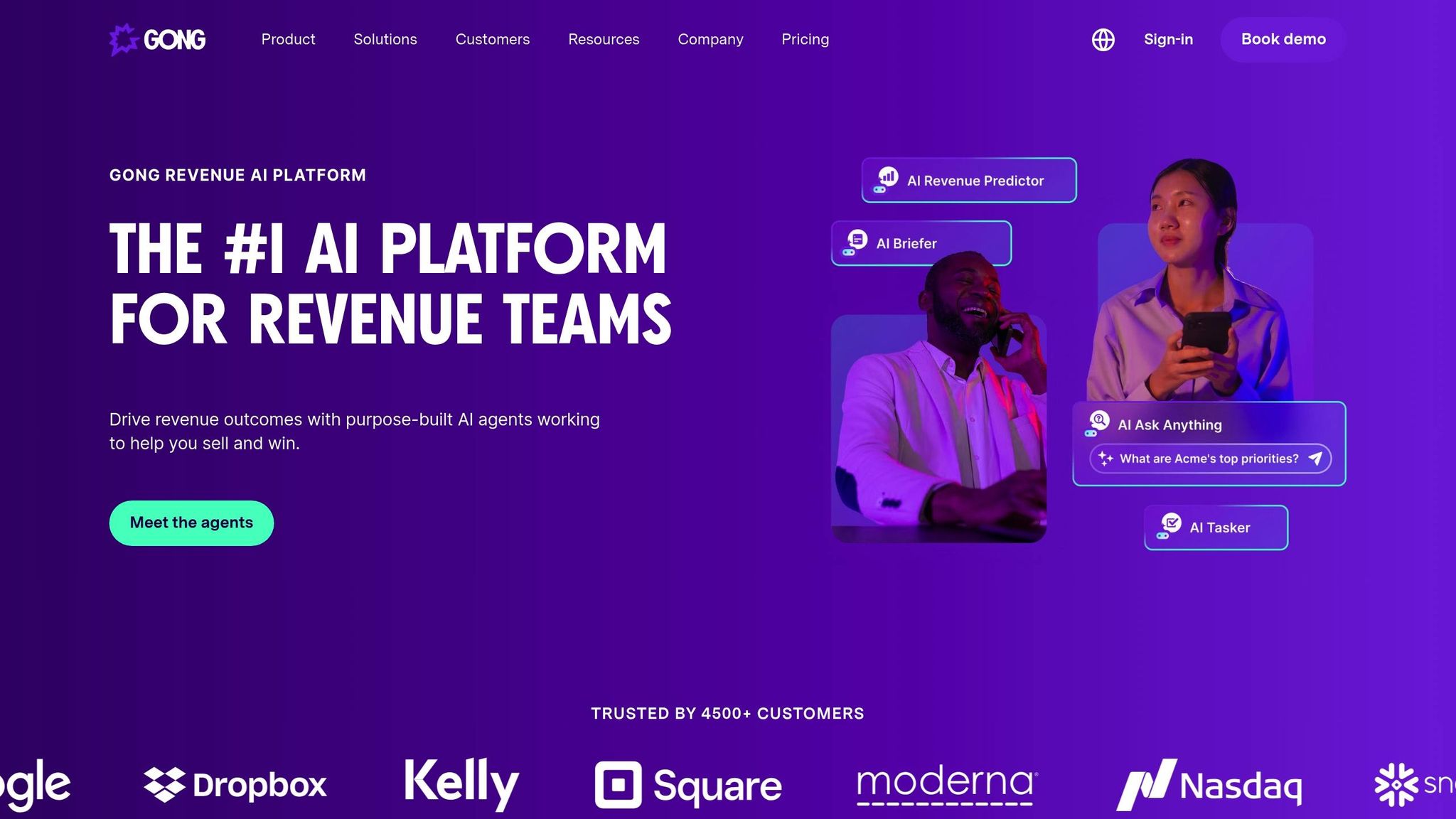
Gong.io turns recorded sales calls into practical insights by analyzing speech patterns, sentiment, and conversation dynamics. It flags potential deal risks and offers coaching tips based on data. Designed with American communication styles in mind, Gong.io is ideal for mid-market and enterprise teams, with pricing starting at $5,000 annually plus $1,360–$1,600 per user.
Userpilot: Onboarding and Retention Personalization
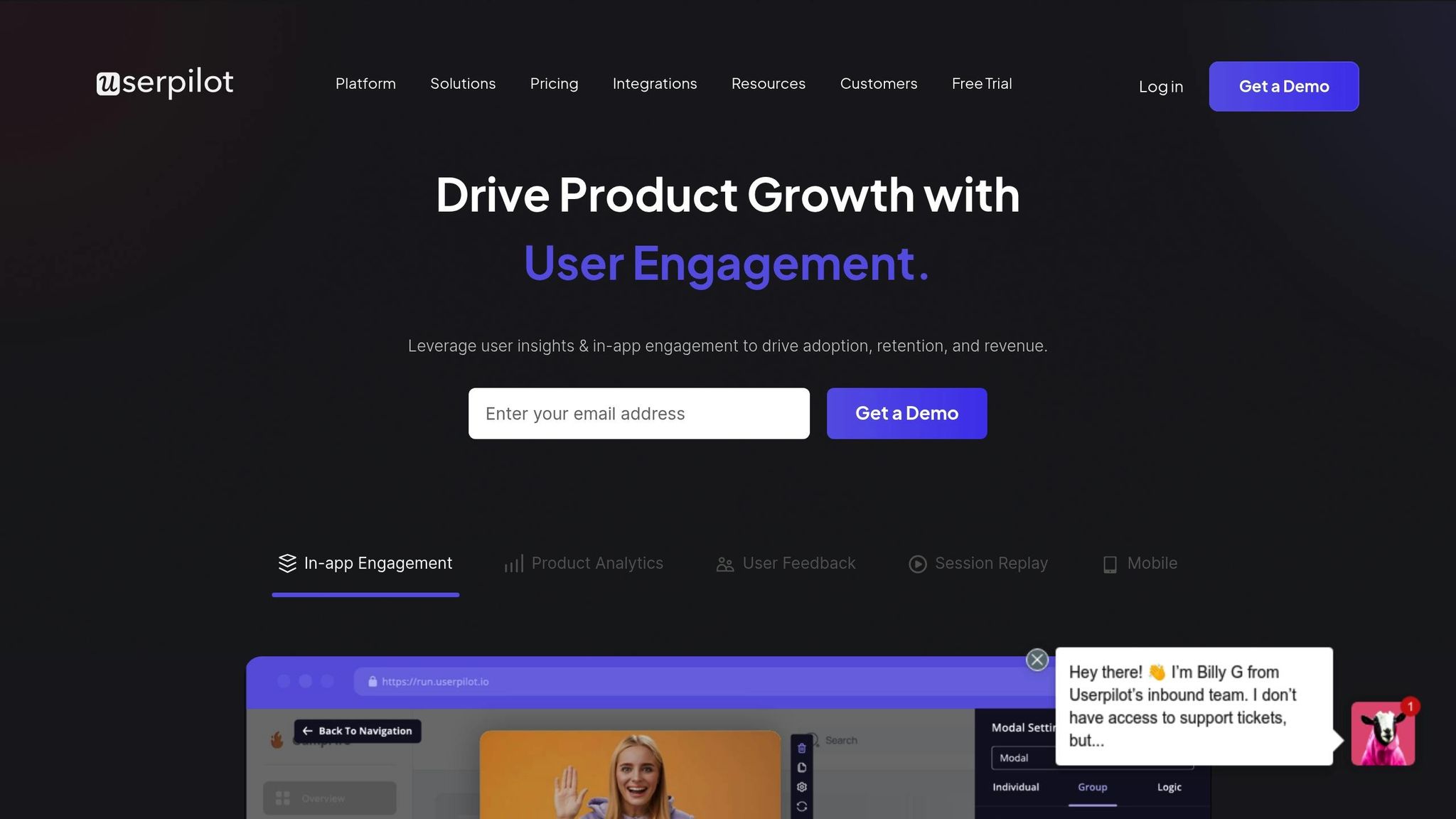
Userpilot helps businesses create onboarding flows tailored to each user’s behavior, role, and goals. Its AI identifies users at risk of churn and triggers targeted retention efforts. Additionally, it tracks feature adoption and suggests upsell opportunities at the right time. Integration with popular U.S. analytics tools and CRMs ensures smooth data management throughout the customer journey.
AI Tools Comparison Table
Compare key features of top AI tools below.
| Tool | Primary Use Case | Key Features | Pricing (USD) | U.S. Integration | Best For |
|---|---|---|---|---|---|
| 6sense | Predictive Analytics & ABM | Anonymous visitor identification, intent data, AI email assistant | Custom pricing | Salesforce, HubSpot, Marketo | Enterprise B2B teams |
| Surfer SEO | Content Optimization | Real-time content editor, keyword analysis, SERP analysis | Starting at $79/month | Google Analytics, WordPress, Jasper | Content marketing teams |
| Drift | Conversational AI | Lead qualification chatbots, meeting booking, intelligent routing | Starting at $2,500/month | Salesforce, HubSpot, Marketo | Mid-market to enterprise sales |
| Unbounce AI | Landing Page Optimization | Smart Traffic routing, A/B testing, conversion optimization | $79–$199/month | Google Analytics, Mailchimp, Zapier | Marketing teams focused on conversions |
| Gong.io | Sales Call Analysis | Conversation intelligence, deal risk alerts, coaching insights | Starting at $5,000+ annually | Salesforce, HubSpot, Outreach | Sales teams with high call volume |
| Userpilot | User Onboarding & Retention | Behavioral segmentation, churn prediction, feature adoption tracking | Custom pricing | Segment, Mixpanel, Amplitude | SaaS companies |
Below is a quick analysis that highlights the strengths and challenges of these tools.
Pros and Cons Breakdown
- 6sense: This tool excels at identifying high-intent prospects, making it a game-changer for enterprise teams. However, its custom pricing can be a barrier for smaller businesses, and it requires substantial data to deliver optimal results.
- Surfer SEO: Known for its real-time content optimization and seamless integration with tools like WordPress and Google Analytics, this platform is ideal for content marketers. Its primary drawback is its limited scope, as it focuses solely on SEO, leaving other parts of the marketing funnel untouched.
- Drift: Drift is highly effective for converting website visitors into qualified leads using AI-powered chatbots. It also offers intelligent routing to match leads with the right sales reps. However, its premium pricing - starting at $2,500 per month - makes it less accessible for smaller organizations.
- Unbounce AI: This tool specializes in improving landing page performance with features like Smart Traffic routing and A/B testing. While it’s great for conversions, it doesn’t address broader funnel personalization needs.
- Gong.io: With advanced analytics for sales calls, Gong.io helps teams identify risks and coaching opportunities. Its pricing starts at $5,000 annually, which, combined with per-user fees, can be a significant investment for smaller teams.
- Userpilot: Perfect for SaaS companies, Userpilot personalizes onboarding experiences and predicts churn risk. Its focus is primarily on post-acquisition stages, which might not suit teams looking to generate leads.
"AI is the next step in business automation. AI had been instrumental in improving business processes. AI can be deployed to an organization's business process for a particular strategic purpose to increase efficiencies, cut costs and improve customer service." - Jasper AI
Integration Considerations
Most of these tools integrate smoothly with popular U.S. platforms like Salesforce, HubSpot, and Google Analytics. In fact, over 60% of marketers have already incorporated AI tools into their workflows. Interestingly, 42.2% believe that AI will allow marketers to dedicate more time to strategic and creative tasks. When choosing an AI tool, it’s essential to evaluate how well it fits with your existing tech stack to ensure smooth compatibility. This insight can help you pick the right tool to enhance your marketing funnel and overall efficiency.
sbb-itb-a84ebc4
How to Add AI Tools to Your Marketing Funnel
To make the most of AI tools in your marketing funnel, start by identifying areas where your funnel might be underperforming. Look at customer behavior and conversion rates throughout each stage - from awareness to purchase - to figure out where customers are dropping off. These gaps are often where AI can make the biggest difference.
Next, define your target audience and map out every interaction they have with your brand, from emails to social media. This process helps you pinpoint exactly where AI can enhance engagement. Whether it’s through personalized content, automated lead scoring, or predictive analytics, understanding your customer journey is key to choosing the right AI solutions.
Set clear goals for your AI initiatives. For example, if you want to increase conversion rates or lower acquisition costs, establish measurable objectives like tracking lead-to-opportunity conversions or monitoring changes in your sales cycle. Start small by testing one area of your funnel - such as email personalization - then analyze the results before scaling up.
Data quality is another critical factor. Make sure your data is accurate, consistently formatted, and compliant with U.S. regulations like the CCPA. Regular audits of your CRM and analytics platforms can help maintain data integrity, which is essential for successful AI implementation.
When selecting AI tools, look for ones that integrate smoothly with your current tech stack. This minimizes disruptions and reduces the need for manual work. At the same time, invest in training your team to ensure they can use these tools effectively. Continuous monitoring and A/B testing will help you fine-tune your strategies and measure the success of your AI-driven efforts.
Keep in mind that changes in one part of your funnel can affect other areas. For instance, improving lead generation might require adjustments in lead scoring or qualification processes. By recognizing these connections, you can make more informed decisions and optimize the entire funnel.
Lastly, use metrics tailored to the U.S. market to evaluate the performance of your AI tools. This ensures your strategies align with local standards and expectations.
Role of Marketing Funnels Directory
To simplify the process of integrating AI into your marketing funnel, consider leveraging external resources like the Marketing Funnels Directory. This platform offers a curated collection of AI tools, vendors, and educational materials designed specifically for U.S. businesses.
Discover vetted AI tools through the directory’s extensive database. Instead of spending countless hours researching, you can quickly find tools that have been evaluated for their effectiveness at different stages of the funnel - whether it’s for social media engagement, B2B lead generation, or customer retention.
Access educational materials that provide practical guidance on AI integration. From courses on sales funnel strategies to books on marketing with AI, these resources help you implement tools effectively and strategically within your overall marketing plan.
Connect with specialized vendors who understand the unique needs of U.S. businesses. These experts can assist with compliance requirements, local market challenges, and seamless integration with popular platforms used in the U.S.
Stay informed about trends in AI marketing with regularly updated content. The directory includes best practices, case studies, and emerging insights to help you stay ahead in the competitive landscape.
Conclusion
AI-driven personalization is reshaping how marketing funnels operate, delivering results that traditional methods can't match. Businesses that integrate AI-powered personalization report over 10% sales increases and a 45% boost in closed deals. These gains stem from the core capabilities of AI: advanced automation, predictive analytics, and real-time personalization. By analyzing data instantly, predicting customer behavior, and automating decisions, AI ensures that customers receive tailored messages at the most opportune moments.
In performance marketing, the results are equally striking. AI can drive 30–50% improvements in ROAS and help create personalized campaigns that see up to 6× higher transaction rates. As Ginni Rometty, former CEO of IBM, put it:
"The future of marketing is not just digital; it's intelligent."
This intelligence shines through as AI identifies high-potential leads with precision, increasing engagement and the number of qualified prospects.
While the metrics are impressive, implementing AI effectively is no small feat. Success requires more than simply adopting tools - it involves navigating a sea of available AI solutions and figuring out how to integrate them into existing workflows. For many marketing teams, this can feel overwhelming. That’s where resources like the Marketing Funnels Directory prove invaluable. Designed specifically for U.S. businesses, this directory simplifies the process by offering carefully vetted AI tools tailored to different stages of the funnel - whether it’s social media engagement or B2B lead generation. It also provides practical guidance and connects businesses with vendors who understand U.S. market demands and compliance requirements.
With more than 75% of organizations already using AI in marketing and reporting higher success rates, the question isn’t whether to adopt AI - it’s how to do it right. Without AI, businesses risk losing 20–30% of potential customers, as previously established. Tools like the Marketing Funnels Directory can help ensure a smoother transition, offering curated solutions and strategic frameworks for leveraging AI-driven personalization effectively.
FAQs
How can businesses choose the right AI tool for their marketing funnel?
How to Choose the Right AI Tool for Your Marketing Funnel
Start by pinpointing your specific goals - whether that’s attracting more leads, improving customer engagement, or driving higher conversions. Having a clear objective will help you narrow down your options.
Next, evaluate tools based on their ability to handle essential tasks like audience analysis, lead scoring, or campaign optimization. Look for features that align with your needs, whether it’s content creation, chatbot support, or detailed analytics.
It’s also crucial to ensure the tool integrates smoothly with your existing platforms. A tool that fits seamlessly into your workflow will save time and reduce headaches. By focusing on solutions tailored to your objectives, you can strengthen your marketing funnel and see real, measurable progress.
What challenges do businesses face when using AI tools in their marketing systems?
Challenges of Integrating AI Tools into Marketing Systems
Bringing AI tools into existing marketing systems isn't always a smooth ride. One major hurdle is dealing with data quality and diversity. If the data being fed into AI systems is incomplete, outdated, or biased, the results can be just as flawed. This can lead to inaccurate predictions or decisions that don’t align with customer needs.
Another common issue? Compatibility with legacy systems. Many businesses still rely on older infrastructure, and integrating advanced AI tools with these outdated systems can create roadblocks, sometimes even disrupting daily operations.
There’s also the critical matter of data privacy and security. AI systems often need access to large volumes of consumer data to function effectively, raising concerns about how that data is stored, used, and protected. Companies must tread carefully to meet privacy regulations and maintain consumer trust, all while navigating ethical challenges that come with AI deployment.
To tackle these challenges, businesses should prioritize robust data management practices. Investing in change management strategies can also help ensure the transition to AI-powered systems is as seamless as possible, minimizing disruptions and setting the stage for long-term success.
How do predictive analytics and real-time personalization improve AI-powered marketing funnels?
Predictive analytics taps into extensive datasets to forecast consumer behavior and preferences. By doing so, marketers can deliver highly targeted content that resonates with specific audiences, ultimately leading to better conversion rates. This approach ensures that businesses direct their efforts toward the most relevant audience at just the right moment.
Real-time personalization takes this a step further by using live data to adjust messaging and content on the fly, based on individual user interactions. The result? Dynamic, customized experiences that not only grab attention but also foster stronger customer loyalty and long-term retention.
When combined, these AI-powered strategies work seamlessly across the marketing funnel, creating personalized and impactful interactions that elevate overall marketing effectiveness.

